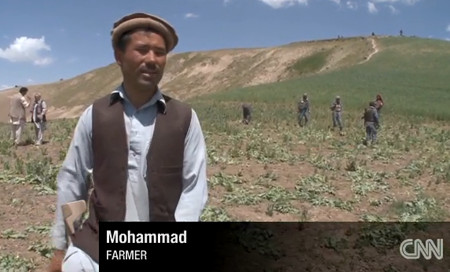By Nick Paton Walsh
Far away from the war, in the remote hills of Badakhshan, there is another battle raging. Trundling into the valleys on dusty roads ripped up by large SUVs, an Afghan task force is heading towards their target: an industry so profitable that many fear it's Afghanistan's only viable option once the West pulls its troops and money out.
We've joined up with the Ministry of Counter Narcotics looking for opium. Here in Badakhshan, the Taliban aren't much of a problem. The real issue is the business that has kept Afghans afloat for many years.
For a while, NATO eased off pushing against the opium trade, feeling that the enemies it created made it even harder to fight the insurgency that was its number one priority. But this year things are different for a reason.

Mohammad, a farmer who grows opium in Badakhshan province told CNN, "We grow poppy because of poverty -- we had no other choice. We didn't grow it for four years here, but the government gave us no help, so we started again. Without it, we'd go hungry."
The price of the drug has tripled, making it highly possible the harvest will flood record profits into the country, according to the United Nations Office of Drug Control here.
"We can definitely see a record profit in this harvest", said the UNODC's director in Afghanistan, Jean-Luc Lemahieu. "Meaning that those who benefit most -- the traders, who are not necessarily the insurgents -- have the incentive to continue the violence, which is the reason why they are able to make the huge profits they have today."
That couldn't come at a worse time for Afghanistan. While most of the money from the opium trade floods into the black economy, some also reaches the insurgency. Either way, it does little to enhance the rule of law NATO so badly wants in order to stop Afghanistan from falling back into being a failed state. The price has risen, says the UNODC, because speculators have pushed it up.
No one knows what the next few years will bring in the country, so opium has become a good purchase. It can be stored for years, is small enough to hide in a house, and is worth an awful lot to a poor farmer. That -- together with the tripling of the price -- is why it's popular.
But in a tiny village we visit in the region of Argu, these arguments mean little. Opium is a basic argument for survival. They not grow wheat in this village, but also opium. Mohammad approaches us, just after police wipe out part of his crop. He lost a leg in a blast in Kabul and now has to deal with the loss of a crop that could have earned him $1,000.
He said, "We grow poppy because of poverty -- we had no other choice. We didn't grow it for four years here, but the government gave us no help, so we started again. Without it, we'd go hungry."
Mohammad won't discuss whom he would have sold his crop to. But those cartels are the big worry here. The war funds about two-thirds of the economy, and when NATO's money dries up it'll have to be replaced with something. Opium is the easy answer and along with it warlords and fears of a narco-state.
Here, far away from the war, growing opium is a simple economic argument - the easiest and often only money to be made.



